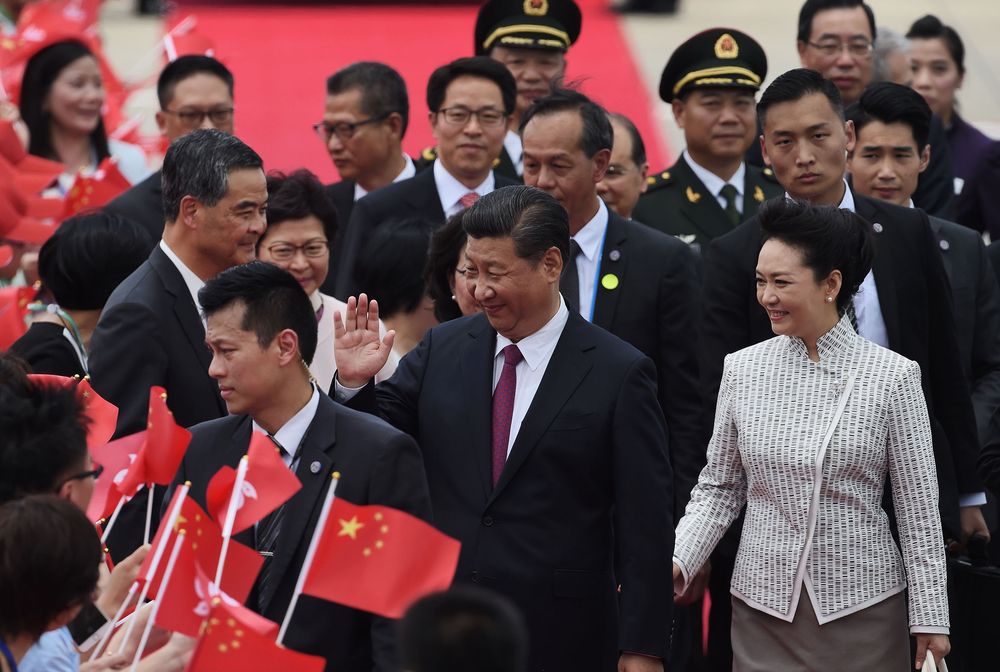- Trump and Xi Say North Korea Must Stop Provocative Behavior
U.S. President Donald Trump and China’s Xi Jinping agreed that North Korea must stop provocative behavior, reiterating their mutual commitment to the denuclearization of the Korean peninsula amid elevated global tensions.
Trump and the Chinese president affirmed that a recent United Nations resolution was an important and necessary step toward achieving peace and stability on the Korean peninsula, according to a White House readout of a phone call between the two leaders Friday night U.S. time.
Xi also told Trump that all concerned parties must maintain restraint and should avoid remarks and actions that could escalate tension, China’s CCTV reported. The U.S. president said earlier that he’s ready to use his country’s military might to end continual threats and provocations by North Korean leader Kim Jong Un.
The phone call between the two leaders came as Japan set up a missile-defense system in western areas of the country. The deployment of four Patriot interceptors in the Shimane, Ehime, Hiroshima and Kochi prefectures began on Friday and was expected to be completed Saturday, a spokesman for Japan’s Ministry of Defense said by phone. He asked not to be named.
Japanese Prime Minister Shinzo Abe told local media earlier on Saturday that he would “do his best” to protect the lives and property of the Japanese people.
New Sanctions
Tensions have been rising over the past week as North Korea and the U.S. exchanged a series of threats after the UN Security Council agreed to new sanctions on North Korea over its nuclear program, aiming to cut its exports by about $1 billion a year.
Trump warned that Kim Jong Un’s regime would face a devastating military strike if it continued threatening the U.S. North Korea responded by saying that it was “seriously examining” a plan to strike Guam with four Hwasong-12 intermediate-range strategic ballistic missiles.
Trump issued another warning Friday, saying that if Kim makes any “overt threat” or strike at a U.S. territory or ally “he will truly regret it and he will regret it fast.”
So far, the most significant measures levied against Kim have been United Nations economic sanctions. Trump said that the U.S. was considering further economic penalties against Pyongyang that would be “as strong as they get,” though he offered no specifics. China has the most economic leverage over the Kim regime.
‘Peaceful Solution’
“Hopefully it will all work out. Nobody loves a peaceful solution better than President Trump,” he told reporters in Bedminster, New Jersey. “We will see what happens. We think that lots of good things could happen, and we could also have a bad solution.”
The U.S. hasn’t taken any public steps to prepare for hostilities such as evacuating Americans from Seoul, which is within range of North Korean artillery, or moving ships, aircraft or troops into position for an imminent response.
“Military solutions are now fully in place, locked and loaded, should North Korea act unwisely,” Trump tweeted on Friday. In a subsequent retweet, Trump highlighted the presence of U.S. Air Force B-1B bombers stationed on the Pacific island of Guam, which have flown joint missions with Japanese and South Korean fighter jets in recent days.
North Korea’s state-run Korean Central News Agency accused Trump earlier of “driving the situation on the Korean peninsula to the brink of a nuclear war.”
Trump has been increasing pressure on North Korea as the isolated regime in Pyongyang has continued to develop and refine its nuclear bomb and missile technology to pose a risk to the U.S. The president has vowed to unleash “fire and fury” on Kim’s regime, which has threatened to fire missiles toward Guam, a U.S. territory about 2,100 miles (3,400 kilometers) southeast of Pyongyang that is home to a strategic air and naval base.
Markets Stabilize
After a week of tumult, financial markets began to stabilize on Friday. The S&P 500 Index rebounded from its steepest drop since May, and the CBOE Volatility Index dropped 3.3 percent, after Thursday’s 44 percent spike.
Terence Roehrig, a national security affairs professor at the U.S. Naval War College in Newport, Rhode Island, said Trump’s posture suggested he was trying to dissuade Kim from further provocations rather than setting the stage for a U.S. military strike.
“The president’s rhetoric could be aimed at China, but largely it is aimed at North Korea, trying to deter,” Roehrig said. “North Koreans are not suicidal. They may continue launching missile tests but they don’t want a war, and the U.S. doesn’t want military action either. ”


 Forex3 weeks ago
Forex3 weeks ago


 Naira2 weeks ago
Naira2 weeks ago
 Billionaire Watch2 weeks ago
Billionaire Watch2 weeks ago




 Naira2 weeks ago
Naira2 weeks ago




 Naira4 weeks ago
Naira4 weeks ago




 Naira2 weeks ago
Naira2 weeks ago


 Naira1 week ago
Naira1 week ago
 Banking Sector4 weeks ago
Banking Sector4 weeks ago




















